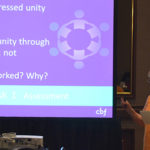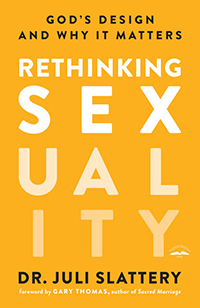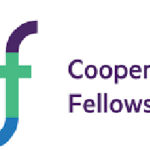ATLANTA—Cooperative Baptists heard a progress report on an initiative to strengthen their unity in the face of differing beliefs and practices regarding human sexuality.
Charlie Fuller, chair of the Cooperative Baptist Fellowship’s Illumination Project committee, presented a one-year progress report to the CBF general assembly about an effort to seek ways to model unity through cooperation in the midst of cultural change.
The CBF governing board launched the Illumination Project last year to shed light on the qualities that have built unity in CBF. Participants hope to design and develop models of dialogue and decision-making by which the Fellowship can grow through cooperation.
Develop a ‘toolbox’ of ways to deal with contentious issues
“The overall objective of the Illumination Project is to develop a toolbox of possible methods that churches and organizations can use to deal with contentious issues,” said Fuller, executive pastor of First Baptist Church in Washington, D.C., and a CBF governing board member.
“While we develop these approaches, we are also exploring a specific question: How can Cooperative Baptists strengthen our unity in the face of differing beliefs and practices in matters of human sexuality? How will our continued cooperation impact our current CBF hiring policy? So we are, in effect, building an airplane even as we fly it.”
Across the last 12 months, the Illumination Project committee has hosted more than 15 conference calls and four in-person meetings, as well as given presentations to Cooperative Baptists in 30 cities. The committee also has conducted more than 30 two-hour structured interviews, “trying to hear deeply the powerful stories of our people.”
“We’re seeking to learn what the fellowship thinks about cooperation, about our shared mission, how we think about faith, and how that plays out when we consider our hiring policy,” Fuller noted.
“It’s been a series of absolutely holy moments as we’ve heard intimate stories of passion for Christ, his church, his Fellowship and those who so desperately need the loving presence of Christ.”
Sign up for our weekly edition and get all our headlines in your inbox on Thursdays
Value the priesthood of believers, autonomy of local churches
The committee is “seeking to be truly and genuinely Baptist in our process,” Fuller emphasized.
“First of all, we both celebrate and have informed our process by the priesthood of the believer,” he said. “As Baptists, we champion the Reformation value that all of Christ’s children have direct access to God and that each of us needs the guidance of fellow priest-believers in the work of discernment.
“Therefore, if we are to hear from Holy Spirit, we must work to hear from the people who sit in our pews, people who represent an incredible richness and diversity. These priest-believers all across our Fellowship are God’s voices speaking in all that richness and diversity. …
“Secondly, we are champions for the autonomy of the local church. CBF does not ordain clergy, and we do not place pastors in congregations. CBF doesn’t tell churches how they are to worship, what they are to study, how they must read the Bible. The autonomy of every church to listen to Holy Spirit for themselves as groups of priest-believers is a bedrock value of CBF.
“Because of this value, the Illumination Project will not be telling any church what they are to do or not to do regarding this matter or any other. Twenty-five years ago, we adopted this as a bedrock value of this Fellowship, and we will not depart from it now.”
Paul Baxley, Illumination Project committee member and senior minister of First Baptist Church in Athens, Ga., emphasized the biblical foundations that underpin the work of the committee, citing Acts 10 and the work of the early church in discernment in diversity. The early church remained united in spite of differences, he said.
“Our committee lives each day in hopeful waiting for the emergence of a more faithful path forward, and we stand before you today not in fear, but rather in the hopeful conviction that together we will see that still more excellent way when the Holy Spirit reveals it to us,” Baxley said. “We dare to believe that way will be a witness in and of itself, and a path to a new season of thriving for our Fellowship.”
Through embracing the approach of Integrative Thinking, the committee seeks to hear and feel the Spirit moving among the priesthood of all believers, Baxley said.
To view the report to the general assembly, click here.
To read more information about the Illumination Project, click here.













We seek to connect God’s story and God’s people around the world. To learn more about God’s story, click here.
Send comments and feedback to Eric Black, our editor. For comments to be published, please specify “letter to the editor.” Maximum length for publication is 300 words.